Cauldron
WARNING: Do not cite this page as a reference. This page is on this wikispace only to make the content "searchable" and easier to find. If you find the information you seek here, go to the original sources to verify the information and use them for your documentation.
See also Tool, Eating .
Examples:[edit | edit source]
Period:[edit | edit source]

|
| Heraldic Cauldrons from OSCAR |
Calderas Gringoladas (snake handles):[edit | edit source]
http://coblaith.net/Heraldry/Regional/Calderas/default.html
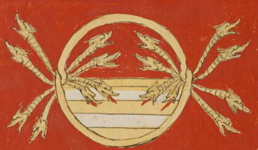
|
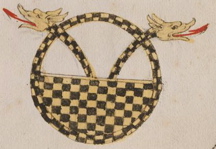
|
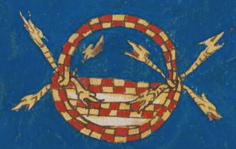
|
| BSB 290, Armas de los Condes, f52r, caldera gringolada | BSB 290, Armas de los Condes, p57r, caldera gringolada | BSB 290, Armas de los Condes, f97r, caldera gringolada |
| Livro so Armeiro Mor | ||
| Livro do Armeiro Mor, Portugal, 1506-09, Pacheco Chefe, Or on Or caldeiras gringoladas |
Modern:[edit | edit source]
Pictorial Dictionary of SCA Heraldry (3rd edition): Pot, Cauldron[edit | edit source]
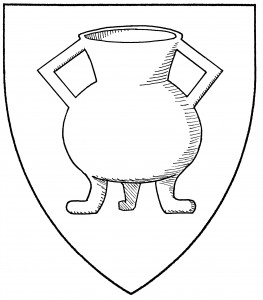
|
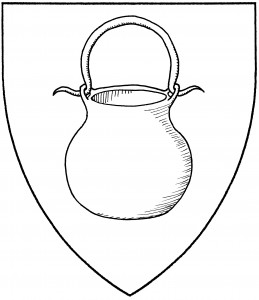
|
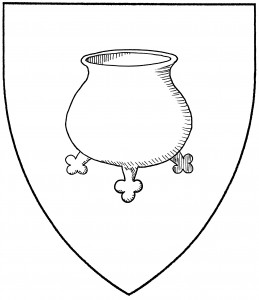
|
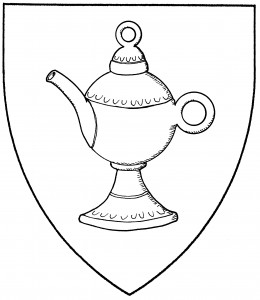
|
| A fleshpot (period) | A cauldron (period) | Three-footed pot (period) | Spouted pot (period) |
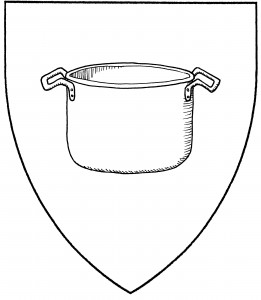
|
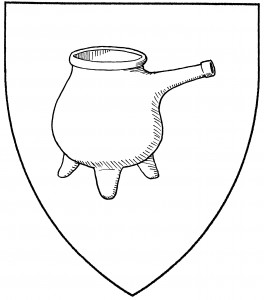
|
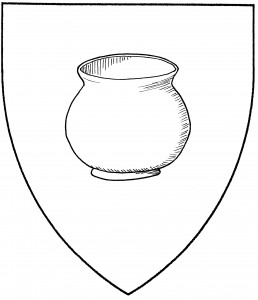
| |
| Pipkin (accepted) | Clay pot (accepted) | Kettle (accepted) |
See also
- Bowl
- see also brazier, cup, lamp
- Pot; Cauldron
- see also amphora, frying pan, ink bottle (ink pot), pitcher, (urn) and also cat (in its curiosity).
Vector Graphics:[edit | edit source]
- Book of Traceable Heraldic Art
- Viking Answer Lady - http://www.vikinganswerlady.com/Stars/Heraldry_SVG_Images/index.htm
Annotated Pennsic Traceable Art Project[edit | edit source]
Precedents:[edit | edit source]
Precedents of the SCA College of Arms - http://heraldry.sca.org/laurel/precedents.html
Morsulus Heralds Website - http://www.morsulus.org/ (to search the LoARs and Precedents)
Use the above links to be sure any precedents listed below haven't been superseded by newer precedents.
Definition:[edit | edit source]
August 2015 - defining instance caldera gringolada:[edit | edit source]
#153Selene Colfox. Badge. (Fieldless) A caldera gringolada barry sable and Or, the serpents Or. This is the defining instance of a caldera gringolada in SCA armory. This charge is a uniquely Iberian charge, and can be seen on f.52r of the 16th century armorial BSB-Hss Cod.icon. 290, Armas de los Condes, Vescondes etc. de Cataluña, de Castilla, de Portugal (found at http://daten.digitale-sammlungen.de/bsb00001370/image_119). It appears to be a later stylized version of an ordinary cauldron with snake heads extending from each end of the handle or from the pot and typically barry or checky tincturing as the main distinguishing features. http://heraldry.sca.org/loar/2015/08/15-08lar.html#153
Nov 2013 - types of pots:[edit | edit source]
From Wreath: Blazoning Fun -- Kitchen Pots and Pans "Turning now to the subject of kitchen wares, a submission this month required us to look more closely at cauldrons and similar pots. In period armorials, the cauldron is the most common cooking pot type of charge. It is typically depicted without legs, although occasionally with three legs, but always with a transverse bail handle (a single arched handle). Another cooking pot found in period armory is the so-called flesh-pot, a similarly shaped pot with three legs and two rounded or angular handles at the rim.
We have received several submissions in the recent past that resemble a cauldron, only without the bail handle. As we have not yet found this depiction of a pot in period armory, we must turn to period artifacts to see if it is attested and thus registerable. A quick perusal of period woodcuts and paintings showing kitchen equipment shows that most cooking pots were cauldrons, with or without feet, either hanging from the bail handle or set directly into the fire.
As for pots without the transverse bail handle, Saint Vitus is commonly depicted with a pot, or in a pot, as a reference to his manner of death. Most typically this is a three-legged pot with handles, or a flesh-pot ([1] ). One period woodcut showed several cauldrons, with three legs, bail handles, and lids, set next to an identically-shaped pot with three legs but no obvious handle ([2]). Band 13 of the manuscripts of the Baden State Library in Karlsruhe (URN: urn:nbn:de:bsz:31-8660), on page 175 ([3]) has a figure drawn in the margin of a mid-12th Century fragment of someone retrieving food from a three-legged pot with no visible handles.
As all three forms of cooking pot are attested in period, all are registerable in armory. We will henceforth blazon pots with transverse bail handles, regardless of legs, as cauldrons. Pots with no bail handle, but with obvious handles at the rim, we will blazon as flesh-pots. Pots without handles but with legs will be blazoned three-legged pots. Pots with no handles or legs will be send back for redraw, unless evidence is presented of that form of cooking pot in period. There is no difference between any form of cooking pot.
Registerability:[edit | edit source]
(Restricted, Reserved, SFPP, OOP)
Conflict:[edit | edit source]
June 2013 - cauldron vs caldera gringolada:[edit | edit source]
#156Selene Colfox. Badge. (Fieldless) A caldera gringolada Or... Commenters discussed whether or not this charge conflicts with an ordinary cauldron. Although the charge appears to be treated as distinct from a cauldron in Iberian armory, this was not obviously the case in the 16th century Italian armorial BSB Cod.icon.267, Insignia pontificum Romanorum et cardinalium II. Insignia ab Urbano VI ad Robertum de Nobilibus cardinalem//. In that source, depictions of the arms of Spanish bishops show the caldera gringolada with distinct snake heads (f.370r, http://daten.digitale-sammlungen.de/bsb00001415/image_751), a faint "fringe" of snake heads (f.299r, http://daten.digitale-sammlungen.de/bsb00001415/image_609), and no snake heads (f.329r, http://daten.digitale-sammlungen.de/bsb00001415/image_669). We must therefore treat the snake heads as a blazonable but maintained element. While caldera gringolada are typically barry or checky, we do not define charges in SCA heraldry based on tincture, and we would certainly allow an ordinary cauldron to be barry or checky, or a caldera gringolada to be a single tincture. Therefore, a caldera gringolada is not considered different from a cauldron for purposes of conflict. Due to their shape and tendency to be barry or checky, they may also conflict with round woven baskets. This badge is returned for conflict with the badge of Aurelie de Montpellier, (Fieldless) A cauldron Or. There is a DC for fieldlessness, but nothing for the difference between a cauldron and a caldera gringolada. http://heraldry.sca.org/loar/2013/06/13-06lar.html#156
Identifiability:[edit | edit source]
Collected Precedents:[edit | edit source]
- 2nd Tenure of Elisabeth de Rossignol (April 2011 - August 2011) - Collected Armory Precedents
- 1st Tenure of Elisabeth de Rossignol (May 2005 - July 2008) - Collected Armory Precedents
- 2nd Tenure of François la Flamme (October 2004 - May 2005) - Collected Armory Precedents
- The Tenure of Shauna of Carrick Point (May 2004 - August 2004) - Collected Armory Precedents
- 1st Tenure of François la Flamme (August 2001 - April 2004) - Collected Armory Precedents
- The Tenure of Elsbeth Anne Roth (June 1999 - July 2001) - Collected Armory Precedents
- The Tenure of Jaelle of Armida (June 1996 - June 1999) - Single HTML Document
- 2nd Tenure of Da'ud ibn Auda (November 1993 - June 1996) -
- The Tenure of Bruce Draconarius of Mistholme (June 1992 - October 1993) - Collected precedents
- 1st Tenure of Da'ud ibn Auda (June 1990 - June 1992) -
- The Tenure of Alisoun MacCoul of Elphane (September 1986 - June 1990) - Collected Precedents
- The Tenure of Baldwin of Erebor (August 1984 - August 1986) - Single HTML Document
- The Tenure of Wilhelm von Schlüssel (August 1979 - August 1984) - Collected Precedents
- The Tenure of Karina of the Far West (December 1975 - June 1979) - Collected Precedents
- The Early Days (June 1971 - June 1975) - Collected Precedents
In the Ordinary[edit | edit source]
(includes bowl, cooking pot, pot)